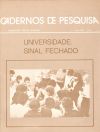Universidade: sinal fechado
Keywords:
Ensino superior, Condições sociais, Estudantes, EscolarizaçãoAbstract
O principal objetivo deste trabalho é a análise da forma pela qual estudantes universitários, provenientes de diferentes classes sociais, percebem e incorporam ao seu projeto profissional e à própria universidade as alterações em processo na sociedade brasileira, no que se refere às formas de recrutamento da força de trabalho e de sua hierarquização. Um questionário com perguntas abertas foi aplicado a estudantes que, no 1º semestre de 1974, cursavam o ciclo geral da Universidade Federal de Pernambuco. A principal tônica do discurso produzido pelos estudantes, com nuances conforme a classe social, foi a postura de que a aquisição de determinadas competências define o acesso a objetos indicadores de certas posições sociais. O papel dos dons e méritos pessoais subsiste, agora não mais apenas dependentes do empenho individual, como também de sua legitimação por parte de uma instituição educacional que confere os mais altos níveis de escolaridade.Downloads
Downloads
Published
How to Cite
Issue
Section
License
Copyright (c) 2013 Cadernos de Pesquisa

This work is licensed under a Creative Commons Attribution-NonCommercial 4.0 International License.
Authors who publish in this journal agree to the following terms:
a. Authors retain the copyright and grant the journal the right to first publication, with the paper simultaneously licensed under the Creative Commons Attribution license that allows the sharing of the paper with acknowledgment of authorship and initial publication in this journal.
b. Authors are authorized to assume additional contracts separately, for non-exclusive distribution of the version of the paper published in this journal (for example publishing in institutional repository or as a book chapter), with acknowledgment of authorship and initial publication in this journal.
c. Authors are allowed and encouraged to publish and distribute their paper on-line (for example in institutional repositories or on their personal page) at any moment before or during the editorial process, as this can generate productive changes, as well as increase the impact and citation of the published paper (See The Effect of Open Access).









